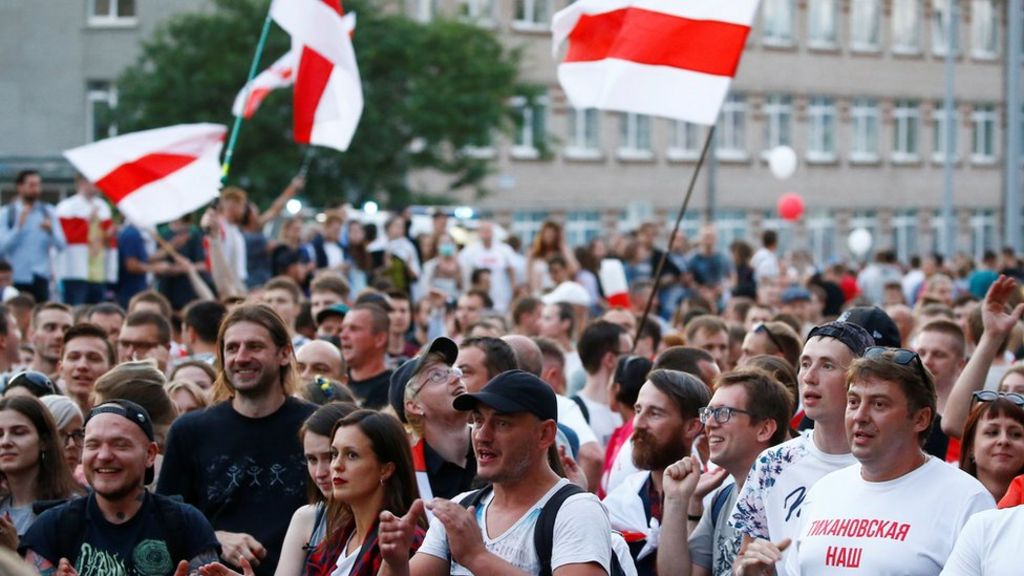
Russian influence in Belarus continues to grow. Since mass protests that erupted after the controversial August 9 presidential election did not result in a regime change, President Alexander Lukashenko managed to consolidate his power with the help of Russia. Will relations between Minsk and Moscow go from strength to strength?
By Nikola Mikovic
The three Baltic states – Lithuania, Latvia and Estonia – all have imposed sanctions on Lukashenko and several Belarusian officials because of the harsh crackdown on demonstrations following the presidential elections. The developments in Belarus caused a severe deterioration in relations between Belarus and its Western neighbors.
Lithuania recently recognized Lukashenko’s major rival Svetlana Tikhanovskaya as “the only legal representative of the Belarusian people”, which will further worsen ties between Minsk and the West. Belarus is expected to soon re-route its cargo away from the Baltic states' ports to Russia's ones, and there are rumors that it can close the country’s borders with Lithuania and Poland.
Such a move would be a risky action, as the anti-Lukashenko opposition would likely stage protests on both sides of the border, and a general atmosphere in the country would be even more tense. Although Belarusian security structures are still capable of handling mass protests, Lukashenko’s legitimacy has already been shaken and he will have a hard time preserving the status quo.
Pressure from the Kremlin
Besides Western sanctions, mass protests and nationwide strikes, Lukashenko is faced with pressure from the Kremlin. In order to stay in power he will likely have to make serious concessions to Moscow. In the past, Russia insisted on Minsk’s deeper integration into the Russia – Belarus Union State, and it also reportedly aimed to set up a new military base in Belarus, which is something that Lukashenko strongly rejected in 2018. Now that his position is much weaker than it was a couple of years ago – as he has been pressured by the West to hold new “free and fair” elections, which forced him to go Eastward and ask for Russia’s help – he will likely have to agree on Russia’s terms and conditions regarding the future of the Russia – Belarus Union State, and possibly even Eurasian Union.
Lithuania’s Parliament issued a resolution which states that any documents that Lukashenko may sign with Russia will be recognized as invalid. Such a document can be interpreted as the West’s strong message to Kremlin not to sign any deals with Lukashenko, or Russia may face additional packages of sanctions.
In the long term Belarus could become for Russia a suitcase without a handle. On the one hand, Moscow clearly demonstrated that it is no longer willing to subsidize Belarusian Soviet-style economy, nor is it ready to provide cheap energy to its ally. On the other hand due to threat of anti-Russia sanctions it may not be able to force Lukashenko to sign any agreements that would change the situation in Russia’s favor. Russia could still increase its presence in Belarus within the framework of the current arrangements with Minsk, but not without any risk. It could affect Moscow’s relations with the West.
Geopolitical trade
It is even possible that the Kremlin will eventually create a certain deal with the United States and the European Union to the define the future status of Belarus. If Russia completely abandons Lukashenko, and the West-backed opposition comes to power, it would be interpreted as another Russia’s geopolitical defeat, even though the Kremlin propagandists would likely try to present it as a “magnificent victory” as Russia will not have to “feed nine million Belarusians any more”. At this point, such an option does not seem very realistic: the Kremlin is more likely to use Lukashenko as a bargaining chip in its geopolitical trade with the Western powers.
Alexander Lukashenko, an experienced politician, is quite aware that his room for political maneuver is limited. That is one of the main reasons why pro-Russia rhetoric in Belarusian mainstream media continues to grow. At this point, the Belarusian leader has no other option but to play the Russian card. While in the in the past, Belarus was a relatively sovereign country, even though it was always dependent on Russian energy.
The days of the country’s sovereignty seem to be gone. Lukashenko is expected to simulate that he is still “the strongman” he used to be, while in fact all key decisions about the future of the former Soviet republic will be made in Moscow.
Nikola Mikovic is a Serbian journalist and a senior Geopolitical Analyst he publishes often on The Levant News,





